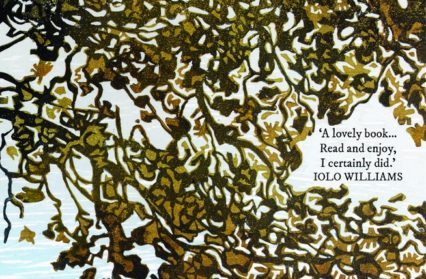Sophie Buchaillard provides an insight to Jack Smylie Wild’s recently released Riverwise: Meditations on Afon Teifi, which reflects on childhood memories, mental health and the environment through a personal take on the traditional river book.
In the limbo that comes after graduating in philosophy from university and before finding purpose in life, Jack Smylie Wild moves to Llandysul to be with his partner. He has no job, no plan, and no mode of transport. Gifted with nothing but time, he takes to exploring the area on foot. What comes next, Jack describes as something short of a mythical calling. He finds the river Teifi, or maybe Afon Teifi finds him. From its source, near what he figures to be the centre of Wales, radiating along its tributaries – Nant Clywedog-isaf, Hirwaun, Piliau – Jack ambles, following every twist and turn, musing at the landscape, recalling its history, marvelling at its creatures – a grey heron here, an otter there. The journey has accents of Robert Macfarlane’s The Wild Places, evocative of a beautiful Welsh landscape and a reminder of the importance of our connection to nature.
But Riverwise also starts with a warning:
This isn’t a traditional river book: It doesn’t tie history and scholarship into an ordered, geographically straightforward account of the Teifi’s course. I tried, once, to write such a book – but the voice that came through wasn’t my own. So I wrote this – a description of how life is bound to, and entangled within, the currents of a river I love.
Inspired by the philosopher René Descartes, Jack recounts his meanderings over twenty short meditations, recalling echoes from a childhood shaped by free-thinking, nomadic parents running away from Thatcherite Britain, to finding himself as a poet, a father, and an award-winning baker.
Entwined with his personal journey though, is a broader reflection on the environment. Following the course of the river, Jack meets local anglers who tell him of the steady decline of the salmon population since the 1970s. Spotting a tree, on an otherwise barren hill, he reflects that the “prolonged growth of any tree up here is an event of miraculous defiance in the face of the ubiquitous sheep.” After all, he reminds us, the sheep that we have come to associate with Wales is an alien species, imported from New Zealand. He ruminates on the role this harmless herbivore has played in Wales’ deforestation, contemplating Giono’s lesson in The Man Who Planted Trees, how one man’s dedication can revitalise a whole landscape.
Riverwise is also an exploration of the benefits of nature on our mental health. At first, Jack’s exploration feels almost obsessive, a distraction from the lonely reality of his situation, an escape. “So here I am, traipsing through the darkening wood, in the ominous air, leaving the gentle, sporadic susurration of the road behind, to seek out a nest for the night, to shelter from the storm, to kindle a hopeful fire, and be close to the old earth.”
Yet, with every step, he learns more about his surroundings, and about himself. As he surveys the river, he captures beauty in lyrical descriptions, songs and poems. The physical journey, marked by Ian Phillips’ iconic prints, mirrors Jack’s growth as a writer.
The description of an evening spent with a group of coracle fishermen celebrating the last netting of the season is filled with humour – the image of a pub-crawl on coracle cutting through layers of melancholy – conveying the deep affection he has developed for his newfound community.
In the end, the bed of the Teifi draws a metaphor for all our lives. “I had collaborated with my map in order to forget that a tiny, flat, white square on paper can signify what in reality is a giant, sloping, water-logged mess, half grass, half mud.” It can be taken literally, as a guide to the curious visitor, or as a meditative invitation to reconnect with nature, in the Japanese tradition of Shinrin-Yoku (forest bath). Reading Riverwise, we are reminded to find meaning in what truly matters.
Riverwise: Meditations on Afon Teifi by Jack Smylie Wild is available now from Parthian.
You might also like…
Beau W Beakhouse and Sadia Pineda Hameed give an insight into LUMIN Journal 3, the third issue of an independent Welsh arts publication.
Sophie Buchaillard is Associate Member of the Society of Authors. She is currently working on two debut novels, Victoria and Little White Lies, whilst completing her MA in Creative Writing at Cardiff University. She is a member of the Welsh Writers’ Group A Zoom of Our Own. Sophie also facilitates workshops designed to support aspiring and established writers alike.



 Enjoyed this article? Support our writers directly by buying them a coffee and clicking this link.
Enjoyed this article? Support our writers directly by buying them a coffee and clicking this link.







